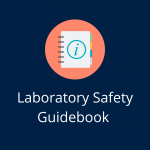| In order to keep the campus community safe and in compliance with applicable regulations and policies, each lab on campus should have a laboratory safety binder for the lab users that is unique to that lab.
HSE provides lab managers with customizable templates to support the development of Laboratory Safety Guidebooks. The intent is that the Guidebook contains University level information related to health, safety and the environment as well as customized laboratory-specific information for methods, policies and procedures.
To access the Laboratory Safety Guidebook click the icon |
 |

